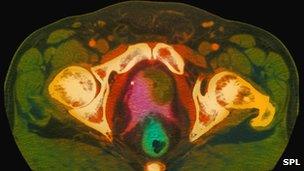Prostate cancer death rate falls by a fifth in 20 years
- Published

Prostate cancer typically affects older men
The death rate from prostate cancer has fallen by 20% in the past 20 years, figures from Cancer Research UK show.
In the early 1990s there were about 30 deaths per 100,000 men but this figure has fallen to about 24 deaths per 100,000, although the number of actual deaths has increased.
The charity says earlier diagnoses and new treatments such as hormone therapy and radiotherapy are behind the trend.
But experts say more work needs to be done to reduce deaths from the disease.
, the number of deaths from prostate cancer has increased because there are more men surviving to an older age (over 65 years) when prostate cancer is most common.
So there were 9,500 deaths per year in the early 1990s compared with 10,800 in 2010, the latest figures available.
But the rates, which show the proportion of the UK population dying of prostate cancer each year, have fallen.
Between 1990-92 and 2008-10, death rates decreased by 21% in men aged 45 to 54 years, 25% in 55 to 64-year-olds, 29% in 65 to 74-year-olds and 25% in 75 to 84-year-olds.
But for men aged 85 and over the overall rate increased by 2%. This could be because men in this age group are less likely to receive radical treatment.
Viper or not?
Prof Malcolm Mason, a prostate cancer expert based at Cardiff University, said although treatments were improving, there was much researchers still had to find out.
"We still don't understand why some prostate cancers turn out be harmless - the grass snakes - while others are aggressive - the vipers - and resistant to treatment. Developing a test that distinguishes between these grass snakes and vipers in prostate cancer patients would help doctors understand which patients are most at risk."
Each year about 41,000 men are diagnosed with prostate cancer. Prostate cancer typically affects elderly men, causing obstruction to the neck of the bladder and impairing urination.
Martin Ledwick, head information nurse at CRUK, said: "The symptoms for prostate cancer are similar to a number of benign and harmless conditions but it's worth being aware of them and getting anything unusual checked out with your GP.
"Things such as having to rush to the toilet to pass urine and difficulty urinating should be checked out, especially if it's getting you up several times during the night."
He also said prostate cancer was more common in anyone who had a relative diagnosed with the disease and men of African-Caribbean descent.
Prostate Cancer UK chief executive Owen Sharp said 10,000 men dying each year from the disease was a "shocking" statistic, equivalent to more than one man every hour.
"The raw truth is that there are simply too few options for men with advanced prostate cancer and even life-saving treatments for less aggressive cancers can have life-changing side effects."
- Published31 May 2013